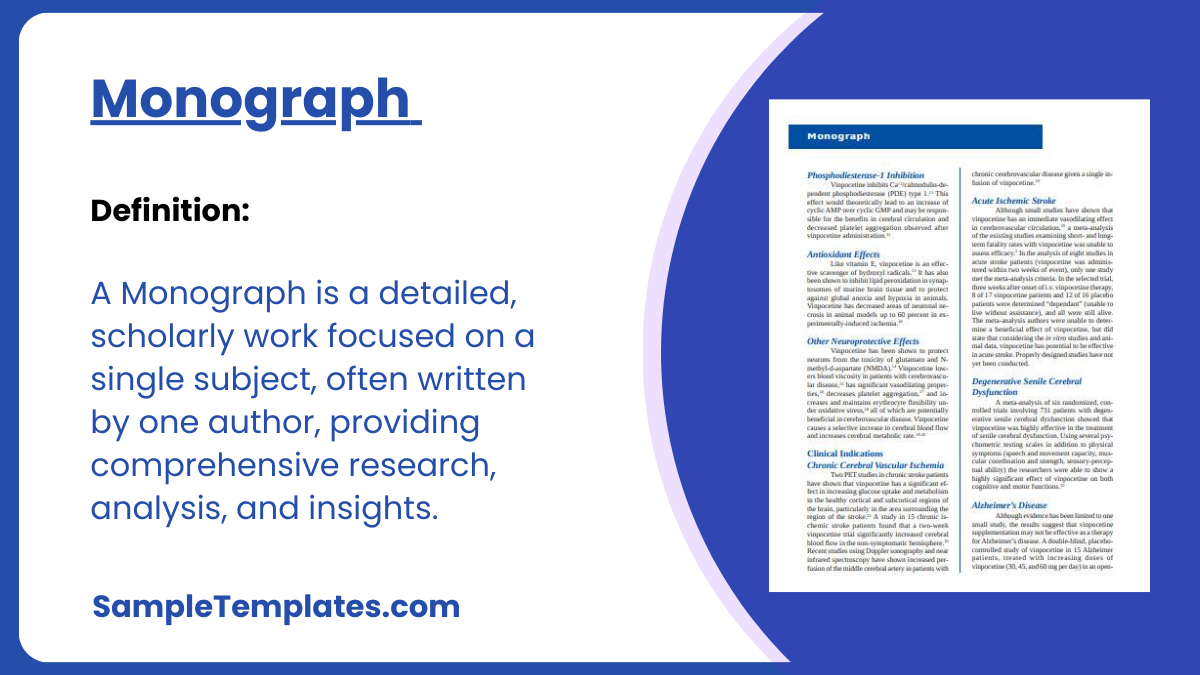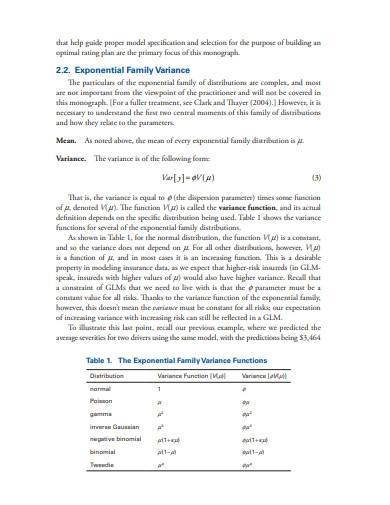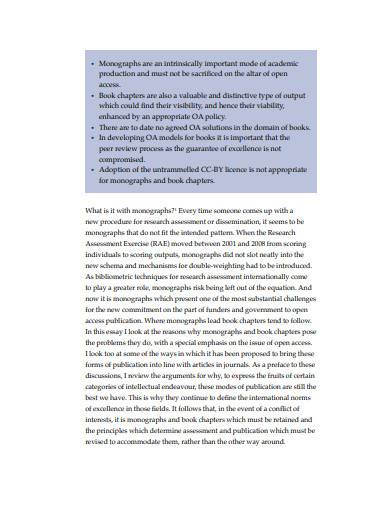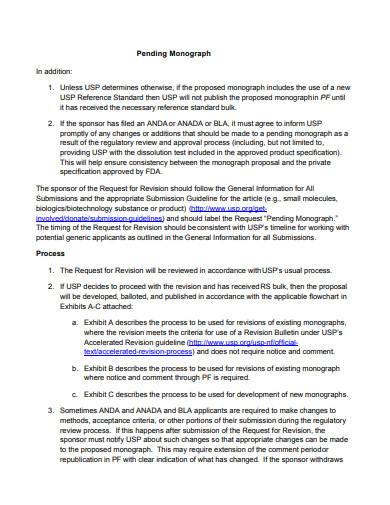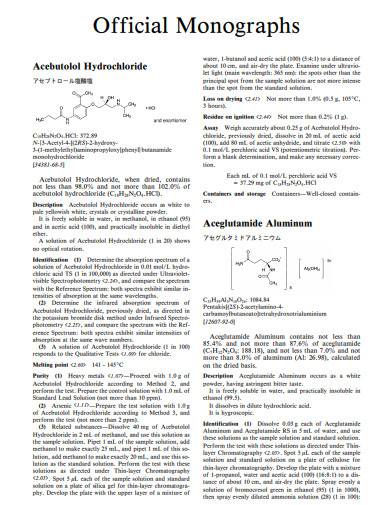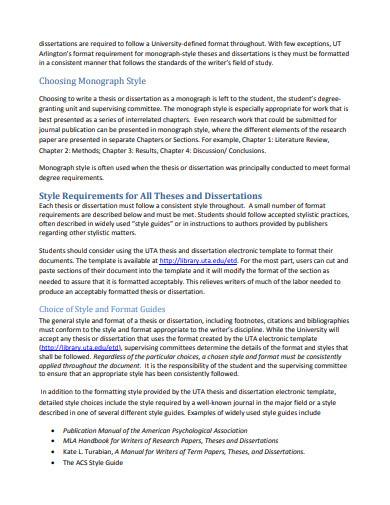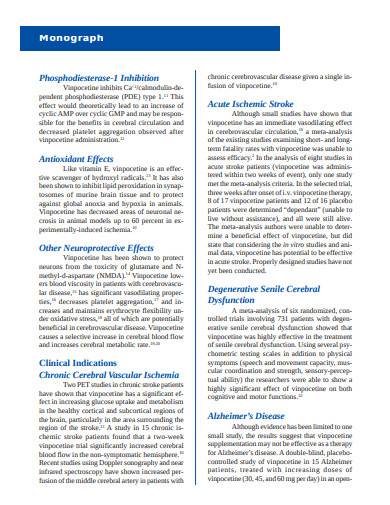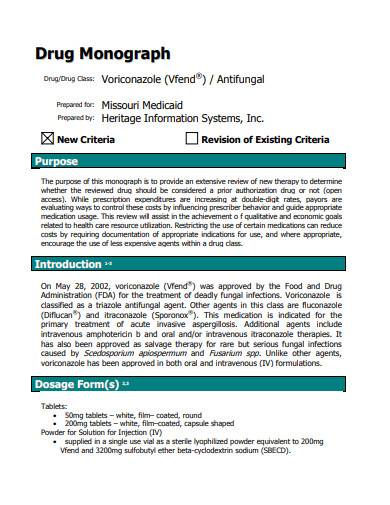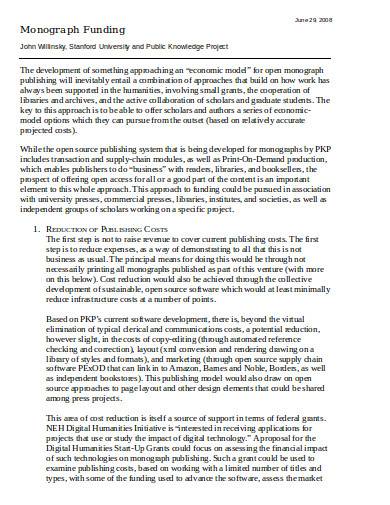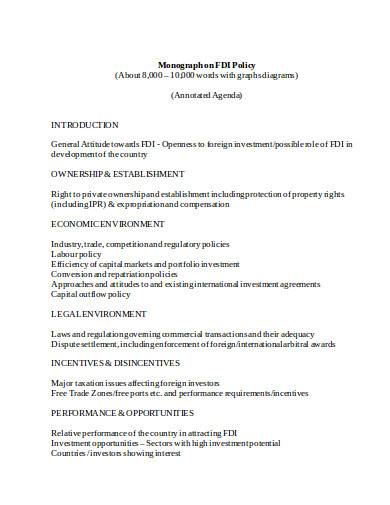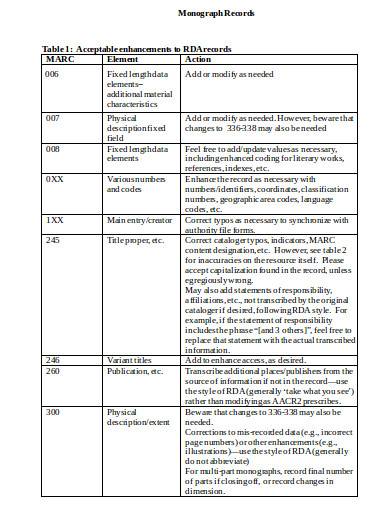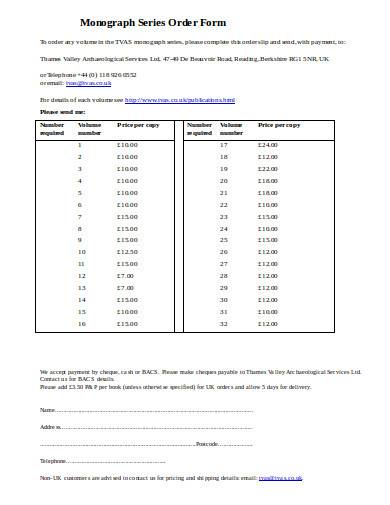Academic articles, like thesis, dissertations, journal articles, and research papers, contain detailed and often in-depth information about a specific topic. These articles are also referred to as scholarly articles because their purpose is to provide information about academic subjects, especially those about science. A monograph is just one of the many scholarly articles that are used by many professionals and people who want to further their knowledge about specific topics. Let’s take a closer look at what a monograph is.
What Is a Monograph?
The term monograph means writing on a single subject in Greek. It is derived from the Greek words mono (single) and grapho (to write). Focus is given on a single subject, usually on a scholarly subject, by an only artist or author, that is why it is also called a specialist type of writing.
There are several definitions of a monograph. Monograph in biology is a comprehensive review of all the species that are known within a group of animals known as a taxon. In academics, a monograph is used to present primary research, which you can find in different research monograph samples. The term artist monograph is used to refer to an art book for a single artist. Other monograph examples include raw material monographs, product monographs sample, and drug monographs, to name a few.
Did You Know?
The first monograph in botany was written in 1672 by Robert Morison, a Scottish botanist, and taxonomist. His work entitled, Plantarum Umbelliferarum Distribution Nova is the first-ever monograph written on a specific group of plants, called the Umbelliferae.
Its word count determines the length of a monograph. There are monographs with word counts between 5000 to 100,000 words or even longer. If you are writing for a specific publication, you may need to comply with their word count requirement. However, there is no standard word count length for monographs.
According to Inside Higher Ed, the most popular monograph has been downloaded 227,336 times already since it has been published in 2016. The title of the said monograph is How the World Changed Social Media, which is written by Daniel Miller et al. The impact of social media in different countries around the world is being explored in this monograph.
10+ Monograph Samples
We have prepared here 10 monograph samples that you will surely find useful. Check them out below.
1. Monograph Sample
2. Basic Monograph Template
How Do You Write a Monograph?
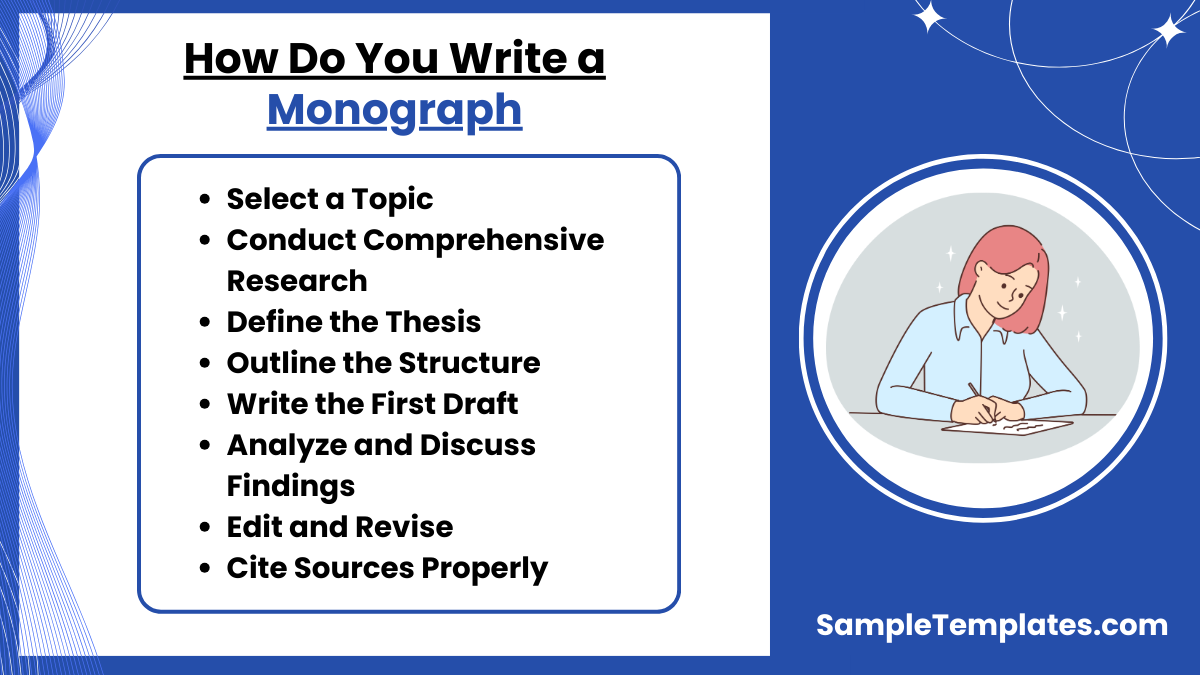
- Select a Topic:
- Choose a specific, well-defined subject within your field of expertise that can be thoroughly explored.
- Conduct Comprehensive Research:
- Gather extensive data and literature on your chosen topic. Use primary sources, scholarly articles, books, and interviews to establish a strong foundation.
- Define the Thesis:
- Clearly state the purpose or main argument of your monograph. This thesis should guide the entire narrative and analysis.
- Outline the Structure:
- Plan the structure of your monograph, including chapters and sections. A typical structure might include an introduction, literature review, methodology, findings, discussion, and conclusion.
- Write the First Draft:
- Start writing the first draft based on your outline. Focus on developing a coherent argument that ties back to your thesis.
- Analyze and Discuss Findings:
- Present your research findings in detail. Analyze the data and discuss its implications in relation to your thesis and the wider field.
- Edit and Revise:
- Review and revise your draft for clarity, coherence, and consistency. Check for factual accuracy, grammatical errors, and academic style.
- Cite Sources Properly:
- Use an appropriate academic citation style to reference all sources. This not only gives credit to original authors but also strengthens the credibility of your work.
3. Pending Monograph Sample
4. Official Monograph Template
5. Monograph Style Sample
6. Standard Monograph Template
How to Write a Research Monograph?
Certain steps are followed when conducting a monograph test for testing pharmaceutical raw materials as well as their finished products. Following simple and essential steps in the creation of any type of monograph are key to completing a useful monograph document. Here are some steps that you’ll surely find useful.
Step 1: Choosing a topic.
It’s essential to choose an exciting topic when writing a research monograph, but it’s also equally important to choose a topic that has an impact on readers. PIN is an acronym that stands for passionate, important, and new. It is used to help writers decide on a topic for their research papers.
Step 2: What makes a good monograph?
An excellent monograph must be complete. It must have a title, abstract, introduction, methodology section, literature review, results section, discussion section, and conclusion. You can check out other available resources to give you ideas on how to format your research paper.
Step 3: Writing the contents.
Write the contents one at a time. Focus on one section and polish that section before proceeding to the next section. There are a lot of reliable sources that you can check out to help you write high-quality content for each section. A few examples are abstract writing samples and templates, sample literature review, and discussion writing samples.
Step 4: Using reliable resources.
Many websites provide access to research samples that you may find useful or relevant to your work. Having a lot of options is better than putting your focus on a single thing that may even prevent you from making any progress to your work.
Step 5: Reviewing the monograph.
Proofread your work. Check for any grammar or spelling errors. Ask help from experts or someone who is knowledgeable about the research topic.
7. Drug Monograph Sample
8. Monograph Funding in DOC
9. Monograph on FDI Policy Sample
10. Monograph Records Template
Purpose of Monograph
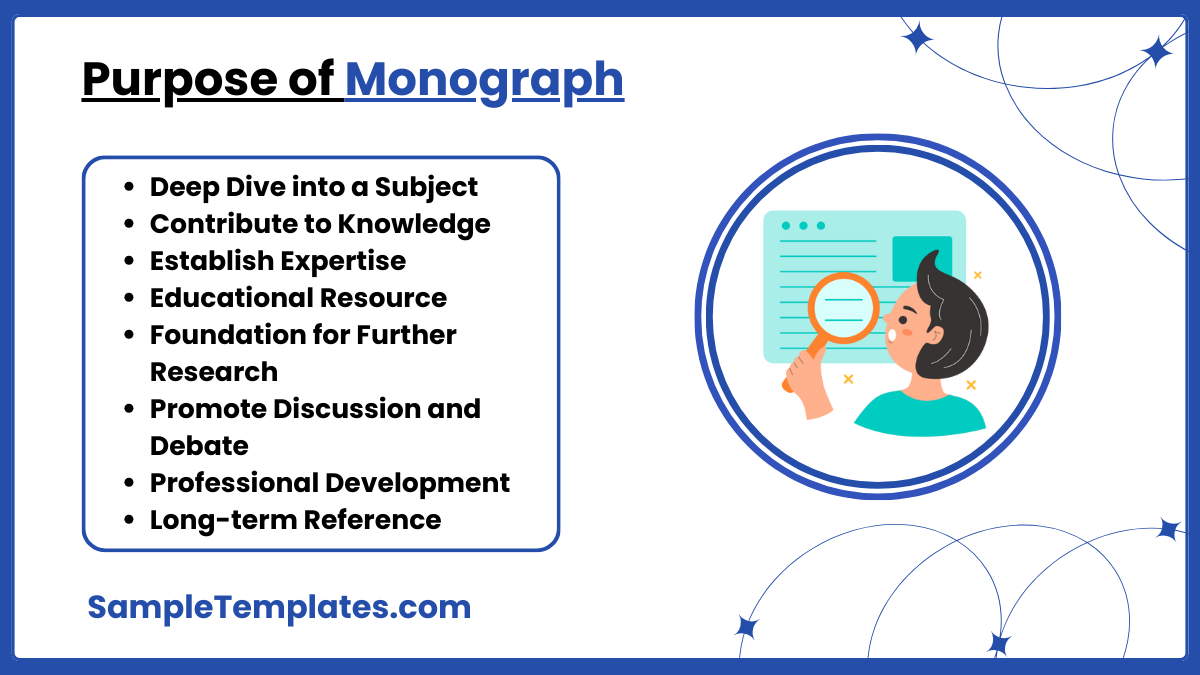
- Deep Dive into a Subject:
- Provides a comprehensive and detailed exploration of a specific topic, allowing for a depth of study that is not typically possible in shorter research papers or articles.
- Contribute to Knowledge:
- Aims to contribute new insights, theories, or understanding to a particular field, expanding the body of knowledge.
- Establish Expertise:
- Helps the author establish credibility and authority in their area of study by demonstrating thorough research and understanding.
- Educational Resource:
- Serves as a valuable educational resource for students, researchers, and professionals interested in the topic.
- Foundation for Further Research:
- Acts as a foundational reference that other researchers can build upon in future studies, extending its relevance and application.
- Promote Discussion and Debate:
- Stimulates academic discussion and debate by presenting new perspectives and findings that challenge existing viewpoints.
- Professional Development:
- Enhances the professional development of the author, as writing a monograph requires rigorous analysis, synthesis, and presentation skills.
- Long-term Reference:
- Provides a long-lasting reference tool in libraries and academic institutions, maintaining its significance over time as a primary source on its subject.
11. Monograph Series Order Form in DOC
Make sure to follow the steps in wrting a research monograph together with the monograph samples in PDF and Word provided above. They serve as great reference materials that will definitely help you make improvements with your monograph writing style.
What does a monograph look like?
A monograph is a single-subject book with chapters, citations, and scholarly analysis, usually structured with an introduction, main body, conclusion, and bibliography, resembling an extended research paper.
Why write a monograph?
Monographs allow scholars to present in-depth research on a specific topic, demonstrate expertise, contribute to academic discourse, and provide a comprehensive exploration that advances knowledge in a particular field.
How many pages is a monograph?
A monograph typically ranges between 80–300 pages, depending on the subject, depth of research, and intended academic scope, often resembling a short book or extended thesis.
How many authors can a monograph have?
A monograph generally has one author to ensure singular expertise and focused analysis, but it can occasionally include co-authors if collaboration enhances research quality or addresses multidisciplinary perspectives.
Related Posts
Doctors Note Samples & Templates
Family Tree Samples & Templates
FREE 37+ Beautiful Printable Bookmark Templates in PSD | MS Word | AI | Publisher | Apple Pages
FREE 10+ Sample Workout Schedules in Google Docs | MS Word | Pages | PDF | MS Excel | Numbers | Google Sheets
FREE 31+ Sample Business Plan Templates in Google Docs | MS Word | Pages | PDF
FREE 22+ Sample Training Plan Templates in Google Docs | MS Word | Pages | PDF
FREE 32+ Cost Analysis Samples in PDF | MS Word | Excel
FREE 10+ Stakeholder Analysis Samples in Google Docs | MS Word | Pages | PDF
FREE 11+ Sample Job Analysis Templates in Excel | Google Docs | MS Word | Pages | PDF
FREE 16+ Business Analysis Samples in MS Word | Google Docs | Pages
FREE 6+ Sample Printable Employee Handbook Templates in PDF | Google Docs | Pages | MS Word
FREE 13+ Policy and Procedure Templates in PDF
FREE 13+ Statement of Work Templates in Google Docs | MS Word | Pages | PDF
FREE 18+ Sample Price List Templates in PDF | MS Word | Pages | Google Docs | Google Sheets | Numbers | MS Excel | PSD | AI | Publisher
FREE 9+ Training Log Templates in PDF | MS Word
